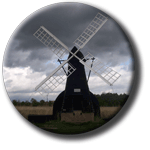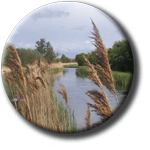The Wicken Fen Home Page
by Matthew Chatfield
U
sing volunteers is now a part of almost every element of the
countryside manager's job. In 1996 Wicken Fen National Nature Reserve, Britain's
oldest reserve, became the  country's
first on-line nature reserve, with help from a local volunteer who runs his
own Internet business. Visitors to the Wicken Fen pages can look at the trail
guides, download photographs and maps, examine species lists, and read the latest
news and sightings. In the future we hope to have information such as the weekly
butterfly census, the daily water level and weather data graphs, references
and publications lists - maybe even an image from our Boxwatch video birdbox!
country's
first on-line nature reserve, with help from a local volunteer who runs his
own Internet business. Visitors to the Wicken Fen pages can look at the trail
guides, download photographs and maps, examine species lists, and read the latest
news and sightings. In the future we hope to have information such as the weekly
butterfly census, the daily water level and weather data graphs, references
and publications lists - maybe even an image from our Boxwatch video birdbox!
Setting up a home page can be expensive and time consuming, if you start from
scratch. However, Wicken Fen has had well over 10,000 requests for electronic
information on its website since we began, and the only expenditure has been
a little staff time and some volunteer expenses. A few other sites and organisations
have now put up their own pages, but there are still very few. With a little
knowledge, most countryside sites or projects could do something similar.
First, check that your own organisation's IT department
has not done it already. Some local authorities and government agencies have
some information up, but many have little or nothing about the countryside.
In my experience, the usual answer is either that a committee is still looking
at it, or that something very large and wonderful will be done early next year,
so it would be best to wait in either case. Your conscience - and your past
experience of waiting for new developments - will tell you whether you do so,
or continue independently. The advantages of going it alone are that you have
much better control over the content, and that you will be able to update things
yourself, as opposed to having to wait for someone else to do so. The two disadvantages
are firstly, that if it all goes wrong, you probably will not get much help,
and secondly, that it will probably cost you more.
 Assuming
you decide to do your own page, you have two options - to do it yourself, or
get someone else to help you with it. The first option could be expensive and
time consuming, if you are starting with nothing. However, it will produce the
best results in the end. The second has immediate advantages, although the results
may not always be quite what you had hoped for. It is often possible to find
someone with some space for home pages who is willing to donate some space to
a good cause, as happened with the Wicken Fen home page. If the space belongs
to a computer company, they might be willing to donate some expertise as well.
Almost every town has at least one firm providing internet services - these
are usually new firms and looking for publicity. Ideal for a sponsorship deal,
maybe.
Assuming
you decide to do your own page, you have two options - to do it yourself, or
get someone else to help you with it. The first option could be expensive and
time consuming, if you are starting with nothing. However, it will produce the
best results in the end. The second has immediate advantages, although the results
may not always be quite what you had hoped for. It is often possible to find
someone with some space for home pages who is willing to donate some space to
a good cause, as happened with the Wicken Fen home page. If the space belongs
to a computer company, they might be willing to donate some expertise as well.
Almost every town has at least one firm providing internet services - these
are usually new firms and looking for publicity. Ideal for a sponsorship deal,
maybe.
The Internet is still a new thing.By
asking around you should be able to find colleague or friend who has Internet
access and a little experience. They will be able to show you how to post a
notice in a suitable newsgroup saying "Wanted, help in setting up home
page for XXX Country Park" or something. You could also try your local
paper or newsletter, if you have one. If you are lucky, you will find someone
to help, either an individual, or a company looking for a sponsorship opportunity.
They do not even need to be local, they might even be in America or Australia.
If you find a volunteer, have a look at something they have already done, and
ask yourself if it is the sort of quality which you need. As using the Internet
is still a hobby for many, finding a volunteer is quite likely. Once you have
worked something out, you will find that you already have plenty of material
to start with. The text for your latest leaflet and poster, your last few press
releases, your annual report - all of these are probably on a computer somewhere.
By all means write something specially for your new pages, but be sure to make
use of what you already have. These will probably be regularly updated anyway,
so you need only get into the habit of sending a copy off to your friendly volunteer.
If one day you get your own Internet account, as I did, you can send the text
directly as email, thus saving even the cost of a stamp.
So if it really is that easy, you may ask, why isn't everybody
doing it? The answer is that many are still waiting to see what will happen.
The Internet is still a new thing. It is not yet widely used  or
seen, and the audience is very widely spread. Promotion on the Internet is not
a replacement for advertisements or leaflets, nor does it have the same effect.
It is rather an investment in the future - raising awareness of your site and
making information more widely available. It is hard to identify the tangible
benefits of a webpage, but last spring Wicken Fen had one. I was meeting a Canadian
scientist who was due to start her PhD at Wicken. "I'm so excited to be
here at last," she said, "It's just like the web page!" I discovered
that she had first found out about Wicken Fen on the Internet, in Canada, and
had decided to cross the Atlantic to continue her work here. A very unexpected
bonus for Wicken Fen.
or
seen, and the audience is very widely spread. Promotion on the Internet is not
a replacement for advertisements or leaflets, nor does it have the same effect.
It is rather an investment in the future - raising awareness of your site and
making information more widely available. It is hard to identify the tangible
benefits of a webpage, but last spring Wicken Fen had one. I was meeting a Canadian
scientist who was due to start her PhD at Wicken. "I'm so excited to be
here at last," she said, "It's just like the web page!" I discovered
that she had first found out about Wicken Fen on the Internet, in Canada, and
had decided to cross the Atlantic to continue her work here. A very unexpected
bonus for Wicken Fen.
The latest news from the Wicken Fen home page is encouraging.
English Nature has offered the National Trust a grant of just under £1000
from the Section 35a NNR Grant Fund to further develop Wicken's web services.
Already the Wicken Home Pages provide a service to many 'visitors' who cannot
or will not ever visit the reserve. As the Internet develops, our web page will
too. There is plenty of room for more information about UK countryside management.
Should some of it be about you?
Matthew Chatfield
This article first appeared in The
Ranger magazine, Spring 1997. Since the publication of this article the
Wicken Fen home page described above has been superceded. Click
here for
Wicken Fen.

 country's
first on-line nature reserve, with help from a local volunteer who runs his
own Internet business. Visitors to the Wicken Fen pages can look at the trail
guides, download photographs and maps, examine species lists, and read the latest
news and sightings. In the future we hope to have information such as the weekly
butterfly census, the daily water level and weather data graphs, references
and publications lists - maybe even an image from our Boxwatch video birdbox!
country's
first on-line nature reserve, with help from a local volunteer who runs his
own Internet business. Visitors to the Wicken Fen pages can look at the trail
guides, download photographs and maps, examine species lists, and read the latest
news and sightings. In the future we hope to have information such as the weekly
butterfly census, the daily water level and weather data graphs, references
and publications lists - maybe even an image from our Boxwatch video birdbox! Assuming
you decide to do your own page, you have two options - to do it yourself, or
get someone else to help you with it. The first option could be expensive and
time consuming, if you are starting with nothing. However, it will produce the
best results in the end. The second has immediate advantages, although the results
may not always be quite what you had hoped for. It is often possible to find
someone with some space for home pages who is willing to donate some space to
a good cause, as happened with the Wicken Fen home page. If the space belongs
to a computer company, they might be willing to donate some expertise as well.
Almost every town has at least one firm providing internet services - these
are usually new firms and looking for publicity. Ideal for a sponsorship deal,
maybe.
Assuming
you decide to do your own page, you have two options - to do it yourself, or
get someone else to help you with it. The first option could be expensive and
time consuming, if you are starting with nothing. However, it will produce the
best results in the end. The second has immediate advantages, although the results
may not always be quite what you had hoped for. It is often possible to find
someone with some space for home pages who is willing to donate some space to
a good cause, as happened with the Wicken Fen home page. If the space belongs
to a computer company, they might be willing to donate some expertise as well.
Almost every town has at least one firm providing internet services - these
are usually new firms and looking for publicity. Ideal for a sponsorship deal,
maybe. or
seen, and the audience is very widely spread. Promotion on the Internet is not
a replacement for advertisements or leaflets, nor does it have the same effect.
It is rather an investment in the future - raising awareness of your site and
making information more widely available. It is hard to identify the tangible
benefits of a webpage, but last spring Wicken Fen had one. I was meeting a Canadian
scientist who was due to start her PhD at Wicken. "I'm so excited to be
here at last," she said, "It's just like the web page!" I discovered
that she had first found out about Wicken Fen on the Internet, in Canada, and
had decided to cross the Atlantic to continue her work here. A very unexpected
bonus for Wicken Fen.
or
seen, and the audience is very widely spread. Promotion on the Internet is not
a replacement for advertisements or leaflets, nor does it have the same effect.
It is rather an investment in the future - raising awareness of your site and
making information more widely available. It is hard to identify the tangible
benefits of a webpage, but last spring Wicken Fen had one. I was meeting a Canadian
scientist who was due to start her PhD at Wicken. "I'm so excited to be
here at last," she said, "It's just like the web page!" I discovered
that she had first found out about Wicken Fen on the Internet, in Canada, and
had decided to cross the Atlantic to continue her work here. A very unexpected
bonus for Wicken Fen.